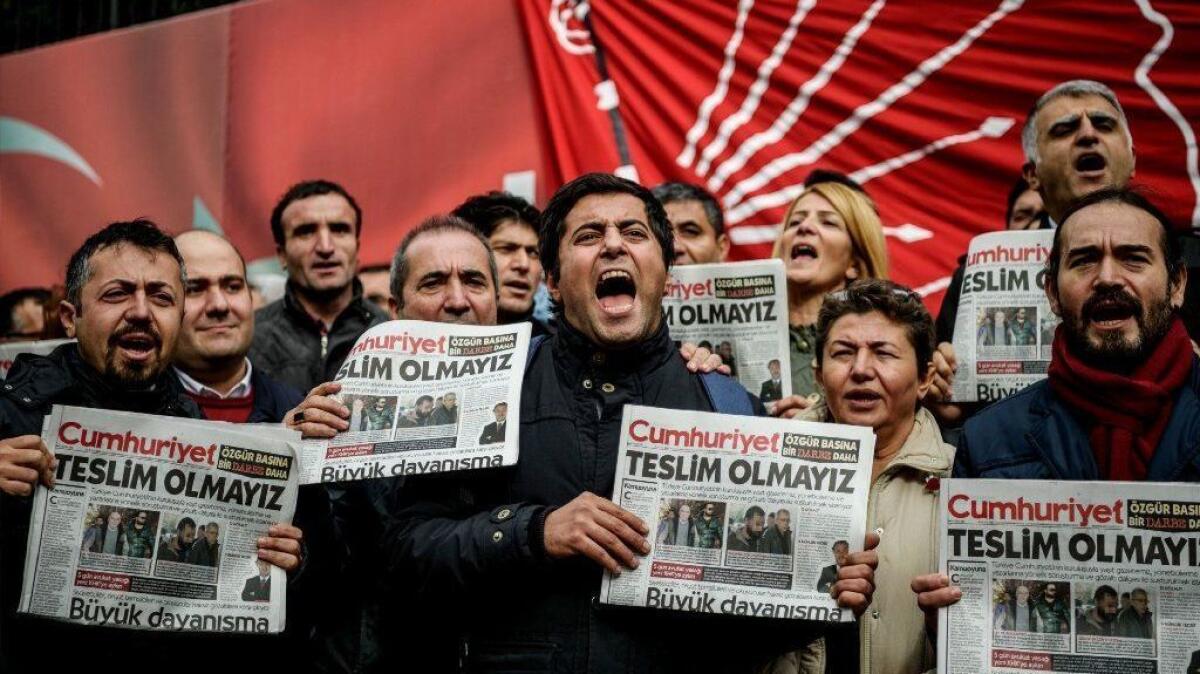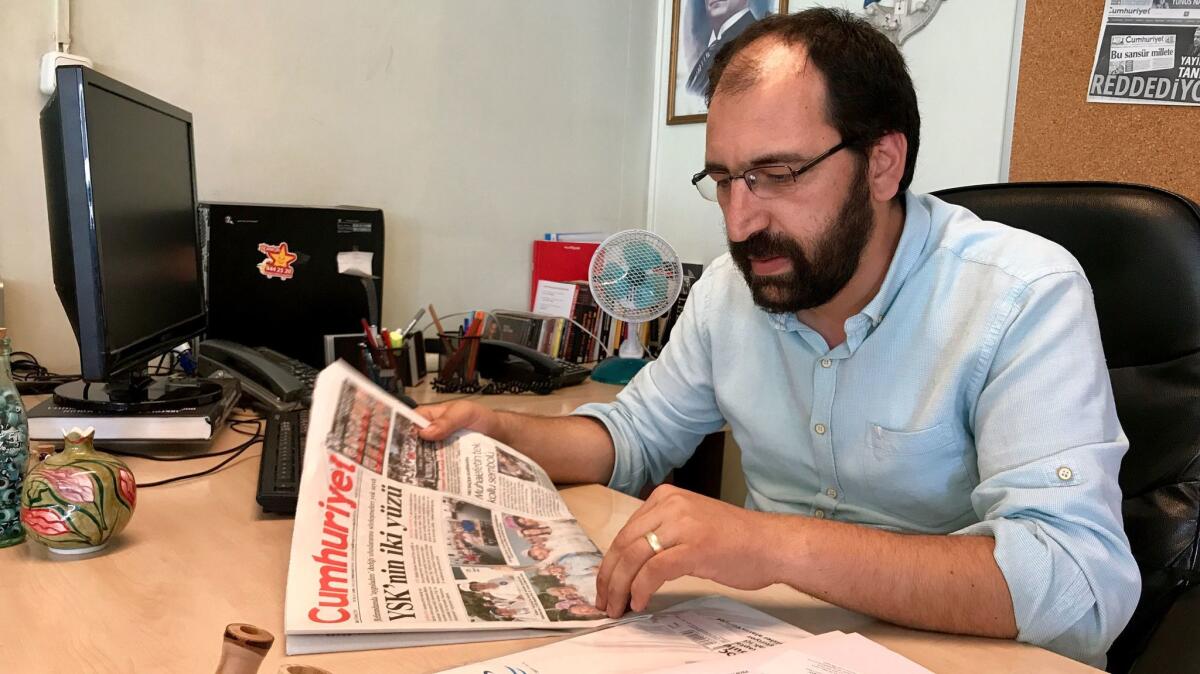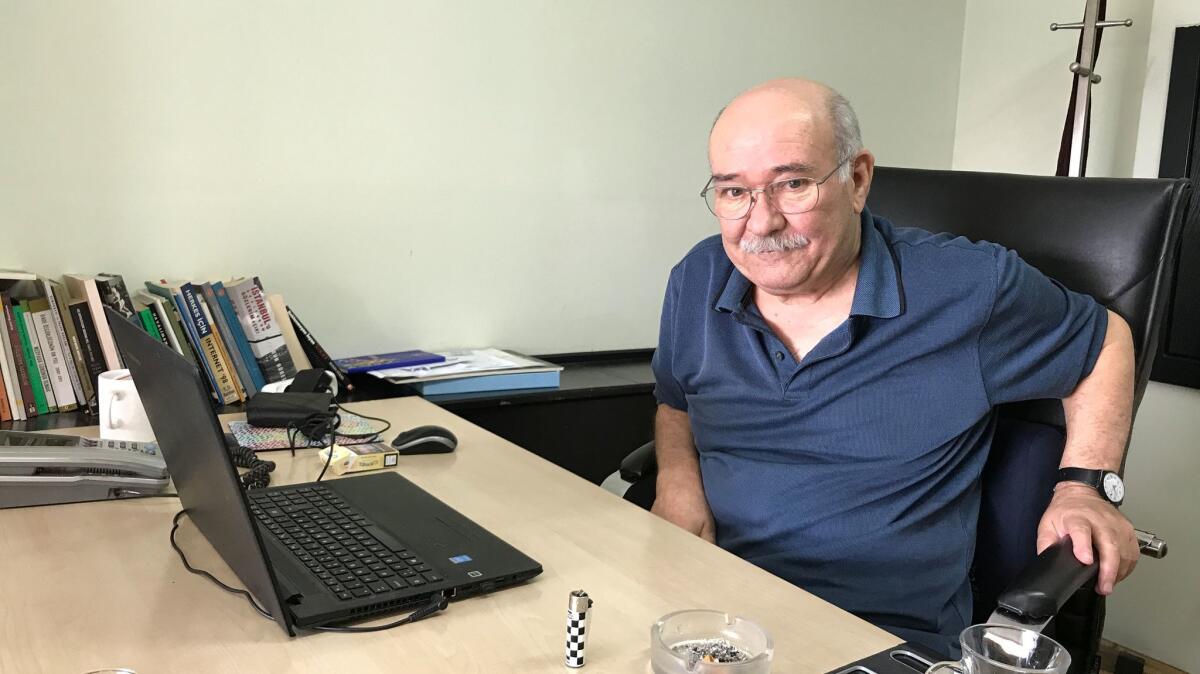A year after failed coup, a Turkish newspaper is in the crosshairs of an increasingly powerful president

Reporting from Istanbul — The front page of a recent edition of Cumhuriyet offered a sampling of the hard-hitting coverage for which Turkey’s oldest independent newspaper is known:
Election officials “violated international law” in certifying a controversial referendum in April giving the president broad new powers. Crowds were flocking to an anti-government protest march. Leaked emails written by the president’s son-in-law were published verbatim, which a prosecutor said was akin to divulging “state secrets.”
Beyond the feisty headlines, however, there were clear signs of the turmoil threatening the century-old daily — and all news organizations that question Turkey’s increasingly authoritarian government.
Atop the front page was a box that has run every day since last fall, featuring portraits of 12 jailed Cumhuriyet executives and columnists who are facing up to 43 years in prison on terrorism-related charges after a failed coup attempt one year ago.
The anniversary of the coup attempt on Saturday will be marked by a series of national events commemorating the spontaneous public uprising that helped repel an attack on parliament and the government of President Recep Tayyip Erdogan. Government supporters will take to the streets to reenact an episode from that night before Erdogan delivers a speech at parliament at 2:32 a.m. Sunday, marking the moment a year ago when the building was attacked.
But for many in Turkey the anniversary is not cause for celebration. Erdogan has used the attempted coup to justify a prolonged state of emergency that has seen tens of thousands arrested, more than 100,000 civil servants dismissed from their jobs, at least 150 journalists imprisoned and scores of independent newspapers, magazines and TV and radio stations shut down.
At Cumhuriyet, there are signs of struggle that go beyond the arrests of top editors. In the recent, 18-page weekday edition, there was only one small paid advertisement, a black-and-white announcement by a Peugeot car dealership tucked into a corner.
Editors say advertisers have deserted a paper seen as a symbol of resistance to Erdogan’s growing authoritarianism.
“Even before the coup attempt we were having difficulty attracting advertising because companies were afraid of the government,” said Atakan Sonmez, the online news editor, bleakly scanning the pages at his desk inside the paper’s gray, six-story headquarters in central Istanbul.
“Now, it’s almost zero.”

Cumhuriyet, which means “republic,” is among the last critical voices publishing in Turkey amid one of the broadest media crackdowns in modern times.
The Islamist government’s main targets have been outlets that it links to the outlawed Kurdistan Workers’ Party, or PKK — which Turkey and the United States have labeled a terrorist group — and Fethullah Gulen, the exiled cleric whom Erdogan blames for directing the attempted putsch from his compound in the Pennsylvania woods.
But Cumhuriyet fits into neither of those camps — it is a bastion of the secular opposition that has bashed Gulenists, the PKK and the government with almost equal vigor. Media advocates say the arrests signaled that Erdogan aims to silence all dissent.
“Cumhuriyet takes the concepts of secularism and democracy seriously,” said Tarik Gunersel, a playwright and secretary of the Turkey center of PEN International, which promotes freedom of expression. “That is why it has symbolic value. Crushing Cumhuriyet is part of the civil war that Erdogan is waging against secularists in Turkey.”
The paper has continued to publish despite the de facto advertising blackout and the absence of nearly all its top editors and executives. Reporters have had to slash expenses and forgo pay raises. Last year, the foundation that administers Cumhuriyet closed some offices and sold others to raise funds.
With a small staff and daily circulation of only about 40,000 copies, Cumhuriyet has long held outsize influence in Turkish public life. Editors and reporters describe their jobs as a labor of love; they have long accepted lower salaries than they could earn at other publications.
But the stress is taking its toll on the remaining staff members, some of whom are balancing a heavier workload with preparing for court dates and visiting relatives of their jailed colleagues.

“Everyone is scared,” said Aydin Engin, a 76-year-old columnist who was arrested at home last Oct. 31 but released pending trial due to his age.
“We know the police can come at any time and take us. It is part of being a journalist in Turkey now.”
Engin, a chain smoker whose eyes twinkle when he cracks a dark joke, has spent a cumulative six years in prison over a career that has spanned three military coups and several states of emergency. In the past, he was prosecuted in army courts under military law, and journalists operated with a general understanding of what topics were forbidden to write about.
Now, he said, it is harder to know what could land you in prison.
In a 435-page indictment against 19 Cumhuriyet employees, prosecutors refer to a July 13, 2016, column by Engin titled, “Peace in the world, but what about at home?” A well-known reference to the motto of Turkey’s founding leader, Mustafa Kemal Ataturk, the column cited terror attacks and argued that Erdogan had failed to secure peace inside Turkey’s borders.
Two days later, the abortive coup took place. The would-be revolutionaries went on Turkish television to declare themselves the “Peace at Home Council” — enough for prosecutors to argue that Engin’s column helped inspire the coup.
“The coup plotters were quite stupid,” Engin said. “But I don’t think that even they are stupid enough to take orders from me.”
Turkey is now the world’s foremost jailer of journalists, but authorities say that all are being held for links to terrorist groups. In that category, the government includes the Gulen organization, an outwardly moderate Islamist movement whose members, critics say, had quietly infiltrated top levels of Turkey’s military and civil service.
In court documents, links to the secretive Gulenists often seem tenuous. Prosecutors allege that Cumhuriyet’s chief executive, Akin Atalay, had hardwood floors installed by a company that also sold goods to a suspected Gulenist, and that Engin used the same travel agency as an alleged member of the group.
We know the police can come at any time and take us. It is part of being a journalist in Turkey now.
— Aydin Engin, Cumhuriyet columnist
With the trial set to begin July 24, the paper last month ran a multi-part series rebutting the allegations against its employees. But other cases involving journalists in Turkey have offered scant hope that the defendants will be given a fair hearing.
On March, 21 journalists who had been arrested for alleged links to Gulenists were ordered released due to a lack of evidence. Their families gathered to greet them at Istanbul’s Silivri prison and waited for hours — only to learn that they had been rearrested on charges of coup-plotting.
Shortly afterward, the judge and prosecutor involved in the case were dismissed from their posts.
“All the decisions are political,” said Engin, who faces up to 15 years in prison if convicted. “Turkey is not a country of laws anymore.”
As one of the most senior journalists left in the newsroom, Engin’s days are filled with administrative chores and writing his column. Staff members stare at empty desks and exchange nervous chatter on the smokers’ terrace.
The building feels besieged — not least by the steel fences, metal detectors and gun-toting police officers posted at the entrance. Security was beefed up in 2015 after two Islamic State militants captured in southeastern Turkey were found to be carrying a paper with the newspaper’s address.
But it has sometimes seemed that the police are there not to protect the newspaper’s employees but to keep an eye on them.
In December, the cafeteria manager, Senol Buran, joked to a security guard that if Erdogan ever visited the building, he wouldn’t serve him tea. A police officer overheard the remark, leaped from a sofa and grabbed Buran by the collar.
“How can you talk about the president like that?” the officer barked.
Insulting the president is a crime in Turkey, and that evening Buran was arrested at his home. He spent eight days in Silivri prison before lawyers secured his release.
“This is part of the work now — people are sacrificing their lives, in a way, to keep the paper alive,” said Can Dundar, Cumhuriyet’s former editor in chief who lives in exile in Germany.
Dundar was convicted last year of espionage and other crimes after publishing videos that showed Turkish intelligence agencies purportedly funneling weapons to rebels in neighboring Syria. He appealed the judgment and was traveling in Europe when the coup occurred, and decided not to return.
He has been separated from his wife, whose passport was confiscated at the airport last year as she attempted to travel to visit him. The arrests have torn apart families and left the remaining editors worried that what they write could further endanger their jailed colleagues.
“Every decision is difficult for them,” Dundar said.
In the weeks after the arrests, Zeynep Oral, a 71-year-old columnist, came to the office every day to support her colleagues and offer comfort to the wives of those who were jailed. As the months have passed, the atmosphere has become heavier, the newsroom emptier.
“There is a huge sadness, and we cannot just lift it by writing,” Oral said. “Of course we self-censor. Each of us has some ways of protecting ourselves. Definitely when I am writing, I hesitate over the words, to choose words that will be less offensive to the government but still give the truth.”
She had planned to retire last year but stayed on after the arrests, continuing to write a thrice-weekly column. But she no longer visits the office daily.
“The days that I go to the newspaper,” she said, “I come home and I cry.”
Twitter: @SBengali
More to Read
Sign up for Essential California
The most important California stories and recommendations in your inbox every morning.
You may occasionally receive promotional content from the Los Angeles Times.











